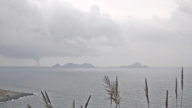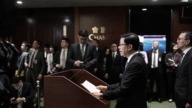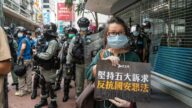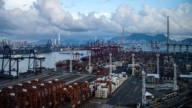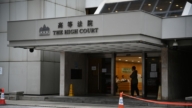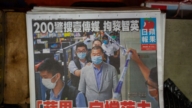【新唐人2015年01月24日讯】日前,中共中央政法委官方网站披露,香港工委和澳门工委负责人,出席了中共中央政法委会议。同时也有消息说,中共已经开始研究向香港引入大陆的《国家安全法》。外界指出,中共当局可能企图对香港实行高压“试水”,不过如果把大陆的法律搬到香港,是行不通的。
据中共政法委员会机关报《法制日报》报导,香港工委和澳门工委负责人,出席了1月21号的中共中央政法委会议。
这是中共当局罕见曝光香港工委的活动,更是首次提及香港工委负责人,参加以“国安、维稳”为主题的最高层级的政法系统会议。报导中没有透露香港工委负责人的姓名,不过消息出来后被各大官方媒体转载。
香港城市大学政治学教授郑宇硕:“是想向香港的民主运动施加压力,我们很担心对香港的民主运动,对香港过去占领运动的活跃份子进行打压。”
香港工委的全称是中共香港工作委员会,属于省一级党委,是中共的派出机构。据透露,因为中共有对香港高度自治的承诺,不方便公开领导特区政府、立法会和法院,因而派出工委,来控制中联办、中资机构和地下党员,并且向特区政府传达北京方面的意思,甚至代表北京向特区政府打招呼。
香港工委历来被外界称为中共在香港的“地下党”,一般很少公开露面。2012年,有海外媒体估计,中共在香港的地下党,规模已经达到40万,占香港人口的5%左右。
香港时事评论员刘锐绍向媒体分析说,虽然目前尚未公开香港工委负责人的身份,但北京可能是希望港人逐渐习惯“地下党”的存在。
香港立法会议员单仲偕指出,香港占领运动后,中共一直污蔑占领运动有外部势力干预,企图将香港列为“颠覆基地”。
香港立法会议员单仲偕:“处理香港的人士都将责任归过外部势力,所以这次出席政法委的会议也是将这个故事称为是一个安全的问题。”
不过也有评论认为,这次香港工委参加中共政法委会议,可能与近期中共反腐中的“猎狐”海外追逃行动有关。
香港作家张成觉:“内地的官员很多和港澳是有联系的,铺了后路的,肯定港澳工委还是掌握一定线索的,所以从中央政法委这个角度,有什么事情需要了解的话,问他们就更直接了当。”
不过,据全国港澳研究会副会长刘兆佳对香港媒体透露,北京已经开始研究向香港引入大陆的《国家安全法》。刘兆佳表示,“占中”事件后,中共中央和香港特区的关系可能会变得“制度化、程序化和具体化”,他认为北京未来可能会强化在香港事务上的参与,特别在重大问题上会进行主导。
单仲偕:“北京真的这样做,是进一步摧毁一国两制,一国两制是说,原来的法律适应于香港,北京不将内地的法律用于香港,但是如果将国安法用于香港,30年前就应该说出来,30年前不说,现在也不应该做。”
2003年香港政府企图通过的《基本法》第23条,就是关于所谓的国家安全,企图将国内滥用的叛国罪、分裂国家行为、煽动颠覆国家政权罪,以及窃取国家机密等多项条文,在香港作出立法。当时引发50万港人参与七一大游行反对立法,最终终止立法程序。
张成觉:“国安法,我看不太容易吧,基本法23条始终受到港人的抵制,国安法要到香港来,把范围扩大,暂时阻力很大,应该北京不会走这一步吧。”
前香港特首董建华最近高调用《基本法》23条立法来威胁港人,令香港社会再度紧张。董建华的言论被泛民派甚至建制派批评为没有政治操守,有学者认为是北京授意董建华发声。
香港城市大学政治学教授郑宇硕指出,只有民主制度才能解决香港经济和社会上的矛盾,国安法和其他高压手段,只能使矛盾激化。
采访编辑/刘惠 后制/葛雷
Hong Kong “Underground Communists” Appear
On Politics and Law Conference.
The Politics and Law Committee (PLC) website recently
revealed that Hong Kong work committee and Macau work
committee responsible people participated in the Chinese
Communist Party (CCP) Politics and Law conference.
Meanwhile, the CCP is planning to introduce
the National Security Law to Hong Kong.
Public analysts say the CCP is likely to attempt
to implement high suppression in Hong Kong.
But it’s unworkable to move mainland
Chinese law to Hong Kong.
According to the PLC official newspaper Legal Daily, the
responsible people from the Hong Kong work committee
and Macau work committee attended the CCP Politics
and Law conference on Jan. 21.
It’s rare that the CCP exposes activities of the Hong Kong
work committee.
It’s even the first time of mentioning that the Hong Kong
work committee head attended a top level meeting of the
political and law system in theme of “national security
and maintenance of stability.”
The report didn’t mention the name of the responsible person
of the Hong Kong work committee.
However the news has been widely spread
by mainland media.
Zheng Yushuo, Professor of Political Science, City University
of Hong Kong: “[It] is to put pressure on Hong Kong’s
democratic movement.
We are very worried that [the central authority] would
crackdown on activists of the Occupy Central movement.”
The Hong Kong work committee is a provincial level
party committee, a CCP agency.
Since the CCP has promised that Hong Kong has a
high degree of autonomy, it’s not convenient to directly
control its government, the Legislative Council and courts.
So, the CCP created a work committee to control the Liaison
Office, Chinese-funded institutions and underground
communists. It also delivers messages for Beijing,
and even represent Beijing giving instructions to Beijing.
The public considers the Hong Kong work committee to be
an “underground party” of the CCP in Hong Kong.
It rarely has public appearances.
Overseas media estimated that in 2012 Hong Kong had
400,000 underground communists.
This is about 5% of Hong Kong’s population.
Hong Kong political commentator Liu Ruishao analyzed in
the media that although the CCP didn’t say the name of the
Hong Kong work committee person, Beijing hopes that
Hong Kong people get used to the “underground party.”
Hong Kong legislator Sin Chung-kai pointed out that after
the Occupy Central movement in Hong Kong, the CCP has
blamed foreign forces “intervening” with the movement,
attempting to topple Hong Kong a “base for subversion.”
Hong Kong legislator Sin Chung-kai, “People who deal with
Hong Kong activists all blame external forces.
So attending the Political and Law conference is also
to consider the incident as a security issue.”
Other analysts believe that the Hong Kong work committee
attending the CCP Political and Law conference is related to
the “fox hunt” project to arrest fleeing officials overseas
under the anti-corruption campaign.
Hong Kong writer Zhang Zhengjue, “Many mainland Chinese
officials have connections with Hong Kong and Macau.
The Hong Kong and Macau work committee must have
some clues as to the officials.
So, from the perspective of the central PLC, knowing about
the officials, it’s more direct to ask the work committee.”
Hong Kong sociologist Lau Siu Kai told Hong Kong media
that Beijing is studying the introducion of mainland Chinese
National Security Law to Hong Kong.
Lau indicated that after Occupy Central, the relationship
between the central authority and Hong Kong is likely to
be more institutionalized, programmed, and specific.
He believes that Beijing may strengthen the interference
in Hong Kong affairs, especially on major issues.
Beijing will be in the dominant position.
Sin Chung-kai, “Beijing’s actions are a further step to
damage Hong Kong’s one country two systems policy.
Original laws in Hong Kong apply to one country two systems,
because Beijing doesn’t use mainland laws in Hong Kong.
But if the National Security Law is implemented in Hong Kong,
it should have done 30 years ago.
If it’s not said 30 years ago, it shouldn’t be done now either.”
Article 23 that the Hong Kong government attempted to pass
in 2003 is about the so-called National Security Law.
It was to legislate offenses of treason, secession of state,
inciting subversion of state power, and the theft of state
secrets into Hong Kong’s law. It raised a protest of 500,000
Hong Kong people against Article 23 on July 1.
Hong Kong eventually terminated the legislative process.
Zhang Chengjue, “I don’t think implementing National
Security Law is easy.
The Basic Law Article 23 has always been resisted by
Hong Kong people.
The National Security Law has even wider range,
which will encounter more resistance.
Beijing shouldn’t take such a step.”
Former Hong Kong chief executive Tung Chee-hwa recently
mentioned the Basic Law Article 23 in such a way as to
threaten Hong Kong people, raising public anxiety.
Tung’s statement was criticized by pan-democracy camp
and even the pro-establishment for having no political ethics.
Some scholars believe that Beijing
authorized Tung to speak up.
City University of Hong Kong professor Zheng Shuoyu
indicated that only a democratic system can solve Hong
Kong’s economic and social crisis.
The National Security Law and other suppression
methods can only intensify contradictions.
Interview & Edit/Liu Hui Post-Production/Ge Lei



